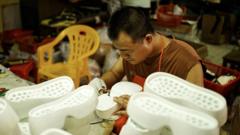Companies like Sorbo Technology are facing dire situations due to President Trump's tariffs which have halted their exports to the US. This report explores the real impact on Chinese manufacturers and workers as tariff tensions persist, affecting not only their economy but American consumers as well.
Chinese Small Businesses Struggle Amid Trump’s Tariff War

Chinese Small Businesses Struggle Amid Trump’s Tariff War
The ongoing trade conflict between the US and China is putting immense pressure on small businesses in China, as they grapple with high tariffs that threaten their livelihoods.
In Guangzhou, small businesses are feeling the brunt of the ongoing trade conflict with the United States, predominantly influenced by President Trump's tariff policies. “This is so hard for us,” laments Lionel Xu, of Sorbo Technology, whose mosquito repellent kits were once popular items in Walmart but now collect dust in Chinese warehouses thanks to a staggering 145% import tax.
Xu, whose enterprise employs around 400 workers, finds himself in a precarious position as nearly half of his production was destined for the American market. “What if Trump doesn't change his mind? That will be a dangerous thing for our factory," he expresses concern, reflecting the anxiety felt by many in China's export-driven economy.
Amidst the chaos, Amy from the Guangdong Sailing Trade Company echoes similar sentiments, stating, “We have stopped production already,” as shipments to the US are halted. The Canton Fair, a massive trade event in Guangzhou, highlights the disarray where countless vendors find their wares inadequately represented; products like food mixers and home appliances are now impractically priced due to added tariffs.
While Trump's temporary tariffs pause aimed to stabilize the markets, the import duties on Chinese goods remain firmly in place. This prompted reciprocal actions from Beijing, which has placed a 125% tax on US imports. As a result, the annual fair has seen bewildered traders from over 30,000 businesses struggling to adapt to the fallout of the trade strife, driven largely by the fluctuating costs of products.
China’s manufacturing sector, responsible for a significant proportion of its economic growth, is under siege. Many businesses are pivoting to meet domestic demands as they grapple with uncertain future export opportunities. Concerns among workers in small factories, who used to earn as much as 400 yuan a day, reveal a grim reality where pay has plummeted to as low as 100 yuan amid the economic downturn exacerbated by the ongoing tariffs.
As small business owners look towards the expansive domestic market of 1.4 billion people, they wrestle with the challenge of convincing consumers to spend amidst a housing market slump that has dampened confidence. Despite attempts by the Chinese government to stimulate growth, consumers have opted to save instead.
While some manufacturers are eyeing opportunities in Europe and the Middle East, others remain wary of the US market. Mei Kunyan, a shoe manufacturer, reveals the shifting industry landscape: “The Americans are too tricky,” he states, as many suppliers relocate operations to countries like Vietnam to remain competitive.
As both nations stand firmly on opposing sides of the tariff divide, the future remains uncertain. With communication between Washington and Beijing dwindling, the window for negotiation appears slim. The looming effects of this trade war are set to resonate not just in Chinese industrial centers but also in American households facing rising prices for everyday products.






















